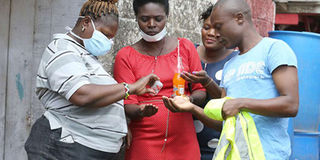Let us fight stigma in Covid-19 but also continue battle on HIV

Businesswomen at Burma Market Nairobi, sanitise their hands when health officials fumigated the market. PHOTO | SILA KIPLAGAT | NATION MEDIA GROUP
What you need to know:
- For years, we experienced how the HIV/Aids stigma and discrimination negatively affected individuals, families and even entire communities.
- The government has some work to do in dealing with and educating its officers who are yet to learn, or refuse to understand, that quarantine is not a punishment but a health intervention.
That the deadly coronavirus disease has become our key collective focus is the reality to the extent that the Ministry of Health has to remind us that hospitals and other health facilities are still treating other illnesses, and that it is business as usual.
The pandemic, which has thrown the world into one huge mass of confusion, continues to affect everything we do — including, generally, the ability to effectively respond to and cope with it. However, we must remain vigilant — even as we deal with the coronavirus disease and try to live within the new normal — so as not to allow the stigma that is creeping in.
For years, we experienced how the HIV/Aids stigma and discrimination negatively affected individuals, families and even entire communities. The effect is still being felt by its victims — including the infected and affected — decades later, since HIV, the virus that causes Aids, struck, leaving behind a trail of destruction in the form of death and untold physical and mental suffering.
GLOBAL EPIDEMIC
That persists, more so in regions that were not as badly ravaged by the global epidemic. That calls for vigilance in the fight not just against stigma and discrimination but also prejudice and stereotyping — some of the biggest barriers to prevention and spread, treatment, care, support, adherence and follow-up to drugs, as well as mother-to — child transmission of HIV.
While writing or commenting on HIV/Aids could appear stale and overtaken by events in times of Covid-19, we must not lose sight of a similar challenge that HIV is and has been, as well as its impact on, especially, women, children and the youth.
Women, specifically HIV-positive young mothers, and their babies living in rural areas are more susceptible to stigma than anyone else, leading to dangers such as failure to adhere to medication as they struggle to hide their infection.
I have encountered situations where desperate young mothers either afraid of being diagnosed with HIV or living in denial have shunned antenatal care. In Kenya, as in many other countries, HIV testing is a requirement for pregnant women seeking antenatal services. And some of these cases have ended tragically.
Stigma and discrimination weaken prevention of the spread of HIV by making people fear to seek the relevant information and services, and disclosure to partners and people who may be supportive, research shows.
This is more prevalent in rural areas, where many HIV-positive mothers are more afraid of stigma from the society, which may lead them to neglect their babies, by, for instance, failing to breastfeed and administer ARVs to them, at least openly.
DISRUPTIONS
And when they have done so in secrecy, it leads to situations of disruptions in the adherence to medication. As a consequence, these same fears are extended to older children — teenagers and adolescents. They are afraid to take their medicine ‘publicly’ because of stigma and fear of being ostracised.
There are situations where such children, mainly in rural areas, have beaten these challenges only to either drop out after primary school, afraid of joining boarding secondary schools out of fear of stigma, while others choose to join day secondary schools with the knowledge that they would continue to take ARVs from the ‘comfort’ of their home.
But let us not bask in the progress against HIV/Aids, even as a lot of energy and focus is fixed on Covid-19. Despite the Health ministry’s pronouncements against stigma amid the coronavirus war, clearly, the government has quite some work to do in dealing with and educating its officers who are yet to learn, or refuse to understand, that quarantine is not a punishment but a health intervention.
Take last week’s case of mother and child thrown into a mosquito-infested empty building with broken windows, with only a piece of carton to lie on, for an alleged breach of the curfew. This should be a call to the government to do more.
For instance, it can work with communities and leaders right from the grass roots to ensure they do not create stigmatising situations against Covid-19 patients and their families, as well as guard against infringement of human rights.
Ms Rugene is a consulting editor. [email protected] @nrugene





